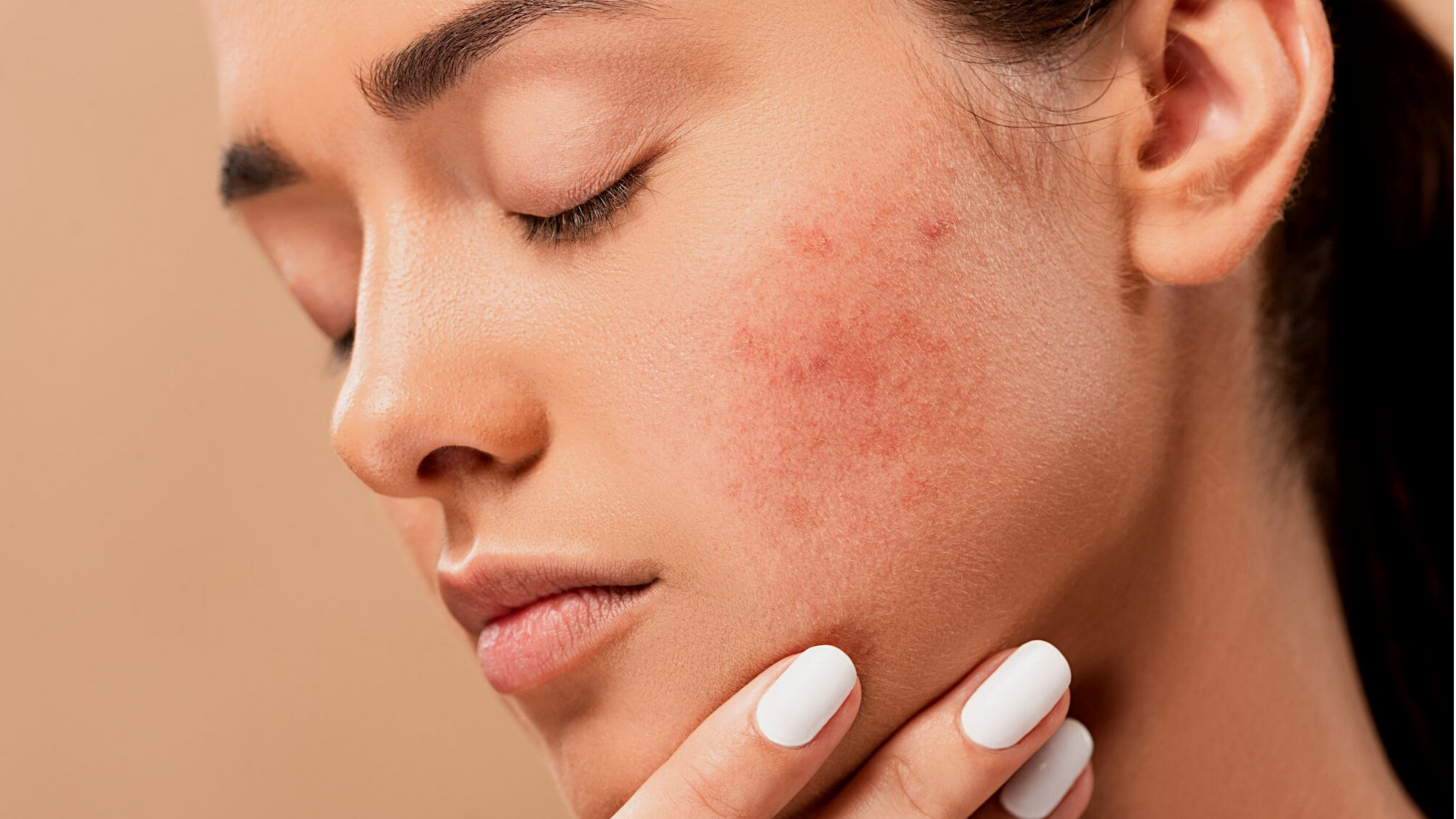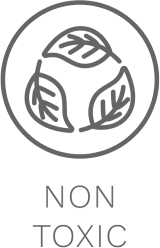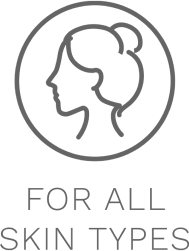There’s a huge number of different acne treatments available from lotions and gels, to face washes, cleansers, and advanced kits all promising to cure your acne in a couple of weeks. You can choose from chemical-based treatments and natural remedies, but knowing which ones are actually going to help reduce and improve acne can be really difficult.
In this article we’ve outlined some of the key ingredients for effective acne treatments that you should look out for:
- Benzoyl peroxide
- Salicylic acid
- Alpha hydroxy acids
- Azelaic acid
- Tea tree oil
- Clay
- Shea butter
- Coconut oil
- Rosehip oil
- Matcha
- Peppermint oil
- Turmeric
Read on for an overview of how each of these ingredients treats acne and possible side effects, helping you to make a decision about what products will work the best for you. Let’s get started!
Chemical ingredients in acne treatments
Many of the active chemical ingredients in acne treatments such as acids can be found in nature, but they are usually produced in a laboratory for skincare products to ensure they’re stable and more effective.
Benzoyl peroxide
This is one of the key ingredients for tackling acne effectively. It can kill the bacteria that causes acne in the first place and helps to remove oil from the skin as well as clears dead skin cells that can end up blocking your pores. This means it’s treating the acne and also helping prevent future outbreaks.
It comes in a range of strengths, with higher concentrations available within prescription treatments only. But over the counter products with benzoyl peroxide can make a noticeable difference for most acne sufferers.
There are a few possible side effects including dry skin, redness, and burning, especially if you have sensitive skin. And it’s also important to be careful when you’re applying treatments containing benzoyl peroxide because it can bleach fabric and hair.
Salicylic acid
Salicylic Acid is a type of beta-hydroxy acid that exfoliates the pores and helps to prevent them from becoming blocked. It works best on blackheads and whiteheads because it can break down the skin debris that’s blocking pores. Salicylic Acid is less effective for treating cystic acne, but it is antibacterial so it can help with preventing further breakouts.
You’ll find it in a lot of face washes and acne gels, but you can also buy it on its own in varying strengths. It can cause mild skin irritation and a stinging sensation.
Azelaic acid
Azelaic acid is suitable for treating all types of acne, including mild, hormonal, and cystic. It can be found as an organic compound, but for skin care products, the acid is engineered in a lab to make it more effective and stable.
A type of dicarboxylic acid, azelaic acid benefits include killing the bacteria in your skin that causes acne, exfoliates to remove dead skin that would block the pores. It also helps reduce the swelling and inflammation of the skin that acne can cause.
For other skin conditions such as melasma or hyperpigmentation, Azelaic acid has its benefits as well in that it inhibits melanin production and reduces the appearance of spots.
Alpha-hydroxy acids
These acids can help to remove dead skins that might block your pores and cause spots, they also help to reduce any inflammation. Additional benefits of alpha-hydroxy acids include stimulating the growth of new, smoother skin, which is something that’s worth considering if you want to improve the appearance of acne scarring.
There are two types of alpha-hydroxy acids that are used to treat acne: glycolic acid and lactic acid. They’re a fairly common ingredient in over the counter treatments and you can also use them on their own to tackle acne and reduce the appearance of blemishes.
To start off with it’s usually a good idea to choose a low concentration cleanser containing AHAs that you use once a day. They can cause dry skin and irritation, and if that happens you should use them less often.
Natural acne-fighting ingredients
Some of the most popular and effective remedies for acne include natural ingredients that people have been using for centuries.
Tea tree oil
Tea tree oil is a natural ingredient that can also help tackle blemishes and acne. It has antibacterial and anti-inflammatory properties, and some people have found the results of using tea-tree oil comparable with using benzoyl peroxide.
If you’re suffering from other skin conditions such as eczema or have particularly sensitive skin then you need to be really careful using tea tree oil as it can be too harsh.
Clay
Clay face masks are a popular skincare trend that has some benefits for your skin. As the clay dries on your face it draws out impurities and oil, helping to detoxify and reduce oil on the face, which can cause spots. Combined with other acne-fighting ingredients, clay can help to treat smaller blemishes, but it’s not the most effective choice for more cystic acne.
Shea butter
Shea butter can help to moisturise and hydrate your skin, reducing acne scarring and soothing inflammation. It’s also non-comedogenic so won’t block your pores and contains antioxidants vitamin A and vitamin E, which can help repair damaged skin.
Coconut oil
Coconut oil has some good antibacterial and moisturising properties so it can be beneficial for acne-prone skin. It’s high in lauric acid, which kills the bacteria that causes acne, and it’s good to use if your skin is dried out from other acne treatments.
However, it’s very comedogenic and can block the pores, which can be problematic for oily skin and acne. So you should use it cautiously and consider cleansing after applying to your face.
Rosehip oil
This contains fatty acids and vitamin A, which moisturises the skin but also can improve the skin's flexibility and promotes skin regeneration. This means it can be really helpful in reducing the appearance of acne scars.
Matcha
Another ingredient that’s full of antioxidants, which are anti-inflammatory and also kills the acne-causing bacteria on the skin.
Peppermint oil
Peppermint oil can soothe irritated skin and has antiseptic and antibacterial properties as well, which can be useful in treating acne. It also helps control excess oil on the skin, so it can help keep pores unclogged.
Turmeric
Turmeric is often used in skin care because it contains antioxidants and has anti-inflammatory properties. It can help skin heal and repair, which means it’s a good ingredient for acne scars.
Treatment vs natural management
Natural ingredients can make a noticeable difference to acne-prone skin. In particular tea tree oil works in the same way as many of the acids that are found in anti-acne skincare products.
However, for severe acne, ingredients like acids and benzoyl peroxide can often offer more noticeable results as they effectively target the causes such as bacteria and blocked pores. Most chemical ingredients can also be found naturally, they’re just created synthetically in laboratories to ensure that they are high enough quality and can be used sustainably.
Whether you want to go with chemical treatments or natural management for your acne, it’s always important to consult with a pharmacist or doctor to understand what would work best for your skin.
When you’re looking into acne treatments you’ll find hundreds of different ingredients, but to effectively tackle the causes and treat the blemishes you should check for these key ingredients.
Written in collaboration with The Independent Pharmacy Skincare Campaign










